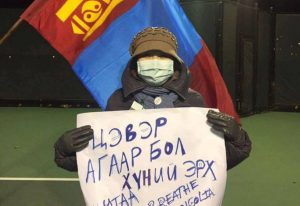-
What We Do
- WHERE WE WORK
-
About Us
 Welcome Message from Carol Jenkins
Welcome Message from Carol JenkinsFor more than 90 years, World Learning has equipped individuals and institutions to address the world’s most pressing problems. We believe that, working together with our partners, we can change this world for the better.
On my travels, I’ve had the opportunity to meet with many of those who have joined us in this mission. In Baghdad, we’ve trained more than 2,300 Iraqi youth who are already giving back at home. In London, our partners in the TAAP Initiative strongly believe that we are all responsible to practice inclusion. And in Vermont, our Experiment in International Living and School for International Training participants prove every day that they have the tools and the determination to change the world.
Please join us in our pursuit of a more peaceful and just world.
- Get Involved
Media Center > Story
Creating a Breath of Fresh Air in Mongolia
March 15, 2017
As part of a series on the Leaders Advancing Democracy Mongolia (LEAD Mongolia) program, World Learning sat down with program participants to learn more about who they are, what they learned from LEAD Mongolia and how they plan to use their experience back home.
LEAD Mongolia is a two year initiative run by World Learning with funding from the United States Agency for International Development (USAID), which aims to bring together aspiring leaders from Mongolia to the United States to learn about democracy, and how they can work together to tackle Mongolia’s most pressing issues, including corruption, poverty, discrimination, urbanization and the environment.
Like many cities, Mongolia’s capital is plagued by heavy pollution. For Dr. Lodoisamba Delgerzul, a trained medical doctor now working for the Faculty of Public Health at Mongolia National University, improving air quality and creating a healthy future for all Mongolians is a vital mission.
Dr. Delgerzul recently returned to Mongolia after spending three weeks in the United States as part of the Leaders Advancing Democracy — Mongolia (LEAD Mongolia) program, which brings together Mongolia’s up-and-coming democracy advocates to share knowledge and insight about their country’s most pressing challenges. Dr. Lodoisamba is addressing the impact of pollution on Mongolian citizens.
According to UNICEF, the leading cause of death for children under five in Mongolia is smog-induced pneumonia. The pollution problem in Ulaanbaatar has also resulted in a high number of children suffering from lower lung functionality and respiratory infections. Dr. Delgerzul says one of the main culprits of the city’s pollution is the use of old fashioned stoves during the winter. She says the problem is getting worse, but because it’s only happening in one city, the government has done little to help. “During the winter the air pollution is at its worst. It’s at a hazardous level, but during summer and spring time there’s no air pollution problem so that’s why our government is not taking action.”
 In late January more than 1000 protestors gathered outside the nation’s parliament building to demand government action in combatting the air pollution problem. To coincide with this demonstration, participants of the LEAD Mongolia program held their own peaceful rally at the University of Virginia. They held signs saying “Air pollution is everyone’s problem!” and “Clean air is a human right! #AirPollution #BreatheMongolia”.
In late January more than 1000 protestors gathered outside the nation’s parliament building to demand government action in combatting the air pollution problem. To coincide with this demonstration, participants of the LEAD Mongolia program held their own peaceful rally at the University of Virginia. They held signs saying “Air pollution is everyone’s problem!” and “Clean air is a human right! #AirPollution #BreatheMongolia”.
Dr. Delgurzul and her fellow LEAD participants plan to implement projects to reduce air pollution, and ask the government to use funding from vehicle taxes to find solutions to end this problematic health issue. “The government says they don’t have money to fix the problem, but they do,” she said. “It’s feasible, and we obviously have the budget to do it.”
Dr. Delgerzul says the LEAD program allowed her to meet with many inspirational leaders who are willing to work with her to help create a healthier future for her country. “What I learned in this program is that if we want to change society, we have to work as a team to be able to educate the public because real power is in the hands of the citizens, not the hands of the decision makers.”





